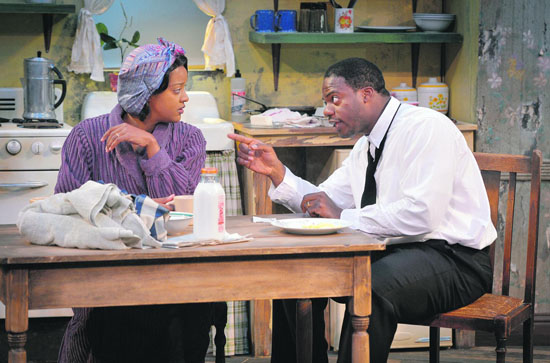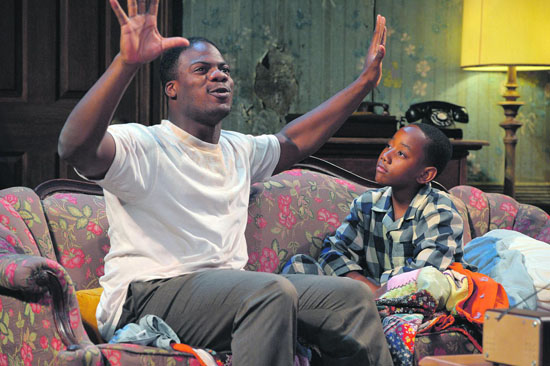 |
|
|
Ryan Nicole Peters as Ruth and Marcus Henderson as Walter in California Shakespeare Theater's production of "A Raisin in the Sun," directed by Patricia McGregor. Photos Kevin Berne
|
|
|
|
|
|
Cal Shakes strides boldly into its 40th anniversary summer season with Lorraine Hansberry's "A Raisin in the Sun," a classic masterpiece in which dreams float, faith falters, and human resilience is the glue preventing societal walls from tumbling.
 The first play written by an African American woman and produced on Broadway, Langston Hughes' poem, "Harlem," lent the landmark work its title. Playwright Hansberry, the then 28-year-old granddaughter of slaves, drove truth onto the stage in 1959, telling the story of the Youngers, a black family in a poor Chicago neighborhood, in which race, poverty and dreams are as volatile as its members.
The first play written by an African American woman and produced on Broadway, Langston Hughes' poem, "Harlem," lent the landmark work its title. Playwright Hansberry, the then 28-year-old granddaughter of slaves, drove truth onto the stage in 1959, telling the story of the Youngers, a black family in a poor Chicago neighborhood, in which race, poverty and dreams are as volatile as its members.
 Lena Younger (the convincing Margo Hall) is the family's matriarch. Standing at the receiving end of a $10,000 life insurance check after the death of her husband, her devotion circles around her son. Walter Lee (played with remarkable nuance by Marcus Henderson) is a man searching for his soul in all the wrong places: women other than his wife, the bottle, and a liquor store he dreams of owning with his mother's money.
Lena Younger (the convincing Margo Hall) is the family's matriarch. Standing at the receiving end of a $10,000 life insurance check after the death of her husband, her devotion circles around her son. Walter Lee (played with remarkable nuance by Marcus Henderson) is a man searching for his soul in all the wrong places: women other than his wife, the bottle, and a liquor store he dreams of owning with his mother's money.
 His wife Ruth, (Ryan Nicole Peters in a role she commands flawlessly) is the family's peacemaker. She coaxes their son, Travis (played by Ajani Barrow on Sunday, May 25), from his bed in the family's too-crowded living room and forgives, but doesn't forget, her husband's weaknesses. Beneatha, Walter Lee's brainy sister (easily captured by the capable Nemuna Ceesay) aspires to be a doctor, while wavering between a moneyed man her family favors and Joseph Asagai, who fills her head with visions of her ancestral Africa.
His wife Ruth, (Ryan Nicole Peters in a role she commands flawlessly) is the family's peacemaker. She coaxes their son, Travis (played by Ajani Barrow on Sunday, May 25), from his bed in the family's too-crowded living room and forgives, but doesn't forget, her husband's weaknesses. Beneatha, Walter Lee's brainy sister (easily captured by the capable Nemuna Ceesay) aspires to be a doctor, while wavering between a moneyed man her family favors and Joseph Asagai, who fills her head with visions of her ancestral Africa.
 When the money finally arrives, Lena puts a down payment on a house in Clybourne Park, an all-white neighborhood. Half the family is transported, even before they move - their minds abuzz with escape from ghetto life as they fill packing crates. But without the money he'd hoped to invest in the liquor store, Walter Lee chides against the loss. Stripped of what he believes represents his manhood, the appearance of a representative of Clybourne Park's neighborhood association is the catalyst causing Walter Lee's internal fire to explode. The man offers to buy the Younger's yet-to-be-occupied home for an inflated price, in order to keep what he calls "you people" from invading the neighborhood. Walter Lee's rage - against racism, his own shame, the partner who runs away with the remaining money his mother entrusts to him, his crumbling self-confidence - threatens the entire family's future.
When the money finally arrives, Lena puts a down payment on a house in Clybourne Park, an all-white neighborhood. Half the family is transported, even before they move - their minds abuzz with escape from ghetto life as they fill packing crates. But without the money he'd hoped to invest in the liquor store, Walter Lee chides against the loss. Stripped of what he believes represents his manhood, the appearance of a representative of Clybourne Park's neighborhood association is the catalyst causing Walter Lee's internal fire to explode. The man offers to buy the Younger's yet-to-be-occupied home for an inflated price, in order to keep what he calls "you people" from invading the neighborhood. Walter Lee's rage - against racism, his own shame, the partner who runs away with the remaining money his mother entrusts to him, his crumbling self-confidence - threatens the entire family's future.
 In the end, the presence of young Travis and the women's relentless love revive Walter Lee's silver lining. He finds a belief in himself strong enough to deny a white man's intimidation and refuses the money's dirty charm.
In the end, the presence of young Travis and the women's relentless love revive Walter Lee's silver lining. He finds a belief in himself strong enough to deny a white man's intimidation and refuses the money's dirty charm.
 "Raisin" is sentimental, especially as viewed through the lens of 21st century cynicism, but Hansberry's dream - like the tiny, forlorn plant Lena nurtures throughout the play - is alive with modern relevance. How many families, of any race or ethnicity, have had future hope sustained by the strength of their community? And how many have been ripped apart by false illusions of prosperity or have dissolved, due to a lack of forgiveness?
"Raisin" is sentimental, especially as viewed through the lens of 21st century cynicism, but Hansberry's dream - like the tiny, forlorn plant Lena nurtures throughout the play - is alive with modern relevance. How many families, of any race or ethnicity, have had future hope sustained by the strength of their community? And how many have been ripped apart by false illusions of prosperity or have dissolved, due to a lack of forgiveness?
 Deft in its direction and design, a first-rate creative team takes the play's 1950s history and stuns contemporary sensibilities with subtle and overt messages proving an era can represent eternity - especially in America, where skin color continues to divide and destroy the country's union. Director Patricia McGregor exceeds expectations, which are high, after her previous turns directing "Spunk" (2012) and last season's "A Winter's Tale." With a bravura cast, McGregor knows when to rein in the firepower - and when to unleash it, wildly unbridled. Avoiding the clichéd, "angry black man" portrayal that Henderson has the acting chops to pull off - by tempering his performance a few degrees shy of outrage - is a sophisticated rendering. And Peters manages to sidestep appearing the victim: credit goes to both actor and director for the agile mastery of a critical role.
Deft in its direction and design, a first-rate creative team takes the play's 1950s history and stuns contemporary sensibilities with subtle and overt messages proving an era can represent eternity - especially in America, where skin color continues to divide and destroy the country's union. Director Patricia McGregor exceeds expectations, which are high, after her previous turns directing "Spunk" (2012) and last season's "A Winter's Tale." With a bravura cast, McGregor knows when to rein in the firepower - and when to unleash it, wildly unbridled. Avoiding the clichéd, "angry black man" portrayal that Henderson has the acting chops to pull off - by tempering his performance a few degrees shy of outrage - is a sophisticated rendering. And Peters manages to sidestep appearing the victim: credit goes to both actor and director for the agile mastery of a critical role.
 So too, is Dede Ayite's splendid set, a balanced world, where worn T-shirts evoke whispered imaginings and water-stained wallpaper peels back illusions like a finely-dressed woman, shedding tears.
So too, is Dede Ayite's splendid set, a balanced world, where worn T-shirts evoke whispered imaginings and water-stained wallpaper peels back illusions like a finely-dressed woman, shedding tears.
 With every element leaning forward, creating light and exposing universalities, it is small wonder this marvelous show casts long shadows. Departing the Bruns Amphitheater, it's possible to be filled with the joy of finely curated theater - and dismayed, that yesterday's battles to defeat racism and poverty are not yet won.
With every element leaning forward, creating light and exposing universalities, it is small wonder this marvelous show casts long shadows. Departing the Bruns Amphitheater, it's possible to be filled with the joy of finely curated theater - and dismayed, that yesterday's battles to defeat racism and poverty are not yet won.
 "A Raisin in the Sun," presented by California Shakespeare Theater, runs through June 15 at the Bruns Amphitheater, 100 California Shakespeare Theater Way (off Highway 24), Orinda. For information, call (510) 548-9666 or visit www.calshakes.org.
"A Raisin in the Sun," presented by California Shakespeare Theater, runs through June 15 at the Bruns Amphitheater, 100 California Shakespeare Theater Way (off Highway 24), Orinda. For information, call (510) 548-9666 or visit www.calshakes.org.

|

